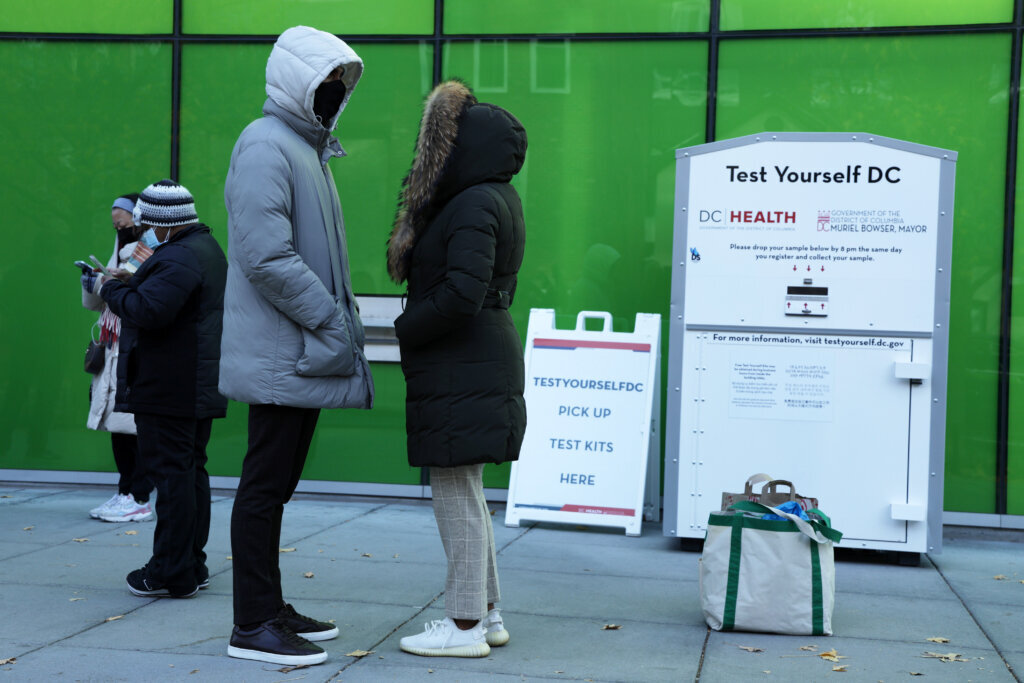
In recent weeks, the start of Aryssa Damron’s day as a children’s librarian at Capitol View Neighborhood Library in D.C.’s Ward 7 has changed.
She routinely arrives 30 minutes early, and by the time she approaches the branch, there’s a line that wraps around the building. The city’s health department facilitates the distribution of rapid and PCR coronavirus tests, in addition to vaccines. But library staff is still in the mix, she said.
As Damron approaches the doors, she’s greeted by eager residents seeking information about when the branch opens and how the distribution will work. It’s more intense than bothersome, she said, but comes with the benefit having some residents explore the facility for the first time.
By the afternoon, the long lines wind down, but Damron and her colleagues remain hyperaware. A few times, they’ve had to tell guests that they cannot take rapid tests in the library, whether at a desk or in the bathroom. But most of the time, Damron said, residents are thankful for the supplies aimed at helping slow community transmission.
Staff at D.C.-area libraries, already pressed to transition to virtual offerings during the beginning of the pandemic, have been thrust onto the front lines as many city and county-run programs have used the libraries as distribution sites. Seven local library staff members in D.C., Maryland and Virginia say in addition to offering new services, providing tests and vaccines on site has proven rewarding.
“We are geographically dispersed in a very smart way,” said Richard Reyes-Gavilan, executive director of D.C.’s public library system. “Residents can access us pretty easily, they know where we are.”
In Fairfax County, Virginia, it’s also a matter of trust.
“Libraries are often times an institution that people think of as trustworthy and as American as apple pie,” Jessica Hudson, director of Fairfax County’s libraries, said. “They’re some place that they know that they can go, that their information isn’t going to be sold or shared, that we’re going to do everything that we can to help them meet their information or recreational needs.”
‘Serving the community’
While D.C.-area libraries were forced to temporarily shut their doors in March 2020, many quickly pivoted to virtual services. But in the months since, libraries have hosted testing and vaccine clinics, and most recently have served as distribution sites for rapid test kits.
In Fairfax, Hudson said, a partnership with the county’s health district brought vaccine and testing opportunities to parking lots at several branches. The distribution of the rapid kits, though, brought additional demand. In December, 2,500 test kits arrived to be handed out at more than 20 sites. Those kits were gone within hours, so the next order was for 10,000 boxes.
Library staff took hundreds of calls daily, prompting the county to amend its phone messaging system to create an option specifically for someone calling about test kits. As of Jan. 4, Hudson said, the county has provided about 45,000 test kits in total.
Libraries in Anne Arundel County, Maryland, have seen similar demand. Library sites have issued over 47,000 coronavirus home testing kits since the program launched in November. The county’s Discoveries: The Library at the Mall branch located in the Westfield Annapolis mall has also served as a convenient vaccination site for store workers who may have difficulty setting time aside to make an appointment, said Christine Feldmann, the library system’s director of marketing and communications.
When people were seeking vaccine appointments, many called libraries “because they knew that staff could navigate the red tape, they knew where to be able to find these appointments,” she said.
“Libraries are trusted partners in the community,” Feldmann said. “Libraries have always been a place where people can get high-quality, accurate information. Whether it’s for a report, or whether it’s just getting a book recommendation, people know they can trust the library. And so they feel comfortable coming into the library for these very difficult needs that they have to get met.”
Montgomery County became the latest D.C.-area jurisdiction to use the library model to hand out rapid tests, rolling the program out at 19 branches across the county starting last week. The day the program launched, the county issued 93,000 kits, said Cassandra Malik, early literacy and children’s services program manager for the county’s libraries.
Each branch handles distribution differently, but staff volunteer to help issue the kits.
“It’s really thanks to them that everything’s gone so smoothly,” Malik said. “They’ve been keeping the lines running incredibly efficiently. … It’s just really been a tremendous effort all around.”
In D.C., working at libraries in recent months has in part meant helping manage crowds. Staff members are often asked when more tests will arrive. Reyes-Gavilan, the D.C. executive director, said staff are working to “make sure that we are remaining in our lane. We’re very proud to be contributing to the effort and making the distribution of tests easier.”
‘Incredibly adaptable’
In addition to serving as testing and vaccination sites and offering traditional and digital services, the demand for new offerings has emerged. Libraries are no longer just places to pick up a book or use a computer, the librarians said.
In early 2020, a regular guest at Eastport-Annapolis Neck Library in Anne Arundel told staff that her husband of 50 years had just been hospitalized, and she couldn’t visit him in person because of the evolving pandemic. She wasn’t familiar with how to navigate Zoom, until the library’s staff taught her.
“That’s a perfect example of us being able to bridge the gap, being able to help people get the training information that they need and just being good community citizens,” Feldmann said. “Our staff was so happy to be able to help her do that because they know how sad she was she wasn’t able to see him for a month.”
And that scenario wasn’t an anomaly.
The county’s branch at Westfield Annapolis mall launched a community pantry in July, said Rachel Myers, the branch manager. Every Saturday from 10 a.m. to noon, staff oversees distribution of diapers, wipes, toothbrushes, toothpaste and menstrual products. They’ve reached over 1,300 people in six months.
“Making that connection again, for people, the library is a place that they can come where there are friendly people that are compassionate, and love our community in ways that we want to help them get what they need,” Myers said.
Between March 2020 and Nov. 2021, Montgomery County, meanwhile, offered 4,600 virtual programs that over 150,000 people attended, Malik, the children’s services program manager, said. And since June 2021, the county has organized 177 outdoor programs.
When the county’s branches were closed, libraries also offered telephone reference and readers advisory services. It also offered a contactless holds pickup service.
“If you look back at the history of libraries, they are incredibly adaptable,” Malik said. “It’s been years since libraries simply offered books for people to check out.”
In Fairfax, programs like story times, adult book clubs and English language learner programs have transitioned to online spaces.
And in D.C., in addition to virtual programming, Damron said staff have become more versatile. Guests inquire about printing at the library, and some have asked librarians questions about the coronavirus vaccines.
Staff also get asked to assist with resumes and emails, and occasionally, someone will wonder if they have newspapers. So many people asked Damron for help with filing for unemployment claims that she has the application saved on her computer’s desktop.
Recently, a young girl stopped by Capitol View with her mom and sister and asked Damron to read her a book. No longer thinking about vaccines, tests or the line that would likely form the following morning, Damron complied, and as she read, the girl put her head on Damron’s shoulder.
“It was just a wholesome reminder of why I’m doing what I’m doing,” Damron said. ” … Seeing her, just, the trust, that kind of embodies the trust you have in a library.”








